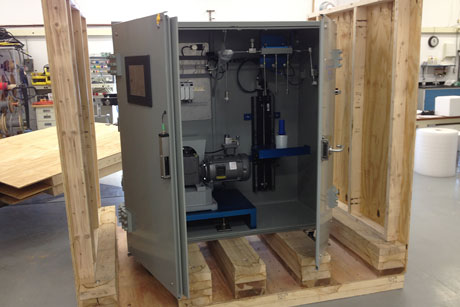High-pressure cryocooler is local company's new product
By Anne Ju
A technology developed by Cornell scientists that prepares proteins for X-ray crystallography has made its way into the world marketplace: ADC Inc., a maker of scientific instruments located just outside Ithaca, has licensed the high-pressure cryocooler, called HPC-201, and has just fulfilled its first order to a research center in Japan.
The licensing agreement is ADC’s first with Cornell. Company president Alex Deyhim says the product is garnering interest from potential buyers, and he’s thrilled to showcase the “amazing work” of Cornell scientists.
“There is a large percentage of technologies that Cornell is developing and filing patents on, and this is a perfect example of one that can create some sales and create jobs in upstate New York,” Deyhim said. “The technology was developed, designed and built here, 10 minutes from Cornell, and we just shipped a unit across the world.”
The science behind HPC-201 was developed in the lab of Sol Gruner, the John L. Wetherill Professor of Physics, who first became interested in high-pressure cryocooling of proteins in about 2002. Since then, he and a steady stream of graduate students and postdoctoral associates, most recently former MacCHESS (Macromolecular diffraction facility at Cornell High Energy Synchrotron Source) scientist Chae Un Kim, began developing the technology that would earn a patent through the Cornell Center for Technology, Enterprise and Commercialization (CCTEC) in 2011.

Protein crystallography, which reveals atomic structures of protein crystals using diffracted X-ray beams, is a tricky business. The crystals are delicate; to withstand X-rays, they must be flash-frozen, typically with the addition of cryoprotectants to preserve them. Preparing samples and finding the correct cryoprotectant for each crystal can risk sample damage and months of work.
Attacking this problem, Gruner’s lab developed a high-pressure cryocooling machine that freezes proteins without the need for cryoprotectants such as glycerol. Crystal samples are picked up using a tiny fiber loop, called a cryoloop, that is mounted on the end of a stainless steel wire. A high-pressure oil pump provides helium gas to the samples, and external controls allow the samples to be pressurized to 2000 times atmospheric pressure, then cooled in a liquid nitrogen bath to a temperature of 77 K (-320 Fahrenheit). Once pressure is released, the samples can be removed from the machine and handled as long as they are kept cold, which is a normal practice for protein crystallographers.
Gruner’s group has published several scientific papers on the cryocooling technique and other scientists have confirmed their results. Since Gruner’s research is supported in part by the National Institutes of Health via MacCHESS, they became interested in bringing the technology to crystallographers everywhere, and it made sense to try to license it.
ADC sought to license the technology, and with the help of CCTEC in the commercialization process, ADC engineers designed the version of HPC-201 that is now being sold for about $100,000.
ADC’s first buyer of HPC-201 was the Ibaraki Quantum Beam Research Center, a neutron facility at Ibaraki University, Japan.
Media Contact
Get Cornell news delivered right to your inbox.
Subscribe